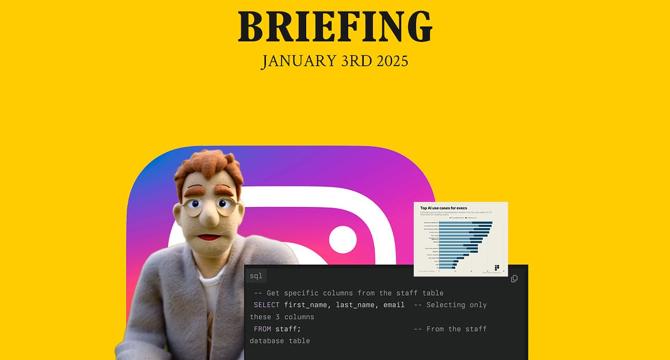Department of Product
1M
227

Image Credit: Department of Product
Meta’s AI Slop, Spotify ghost music and the end of SaaS pricing as we know it?
- Meta, formerly known as Facebook, will allow AI-generated users on its social media platforms, a move expected to impact the user experience; Instagram has demonstrated the ability to use a video shared on its platform with a hat or chain represented using Meta’s AI video model, MovieGen, to illustrate the decision. One downside is that AI-generated users cannot click on ads so products like character.ai will likely succeed since AI personas generate enough engagement. Meanwhile, Salesforce has rolled out Agentforce, reducing the need for hiring software engineers while Spotify uses cheaper stock music from production companies instead of tracks from traditional artists to fill popular mood-based playlists to improve margins.
- To monetize, Instacart will allow Samsung users to shop for groceries on their fridges’ screens using Vision AI food recognition technology to identify what users have in their fridge. It can identify up to 37 food items and suggest items from Instacart that users may need. Microsoft and OpenAI have agreed to a definition of artificial general intelligence (AGI), and once it’s reached, OpenAI can terminate its partnership with Microsoft. The AGI definition they use is “highly autonomous systems that outperform humans at most economically valuable work.” Tinder has recorded more paying users since 2022, accounting for 57% of total revenue.
- The Seat-based SaaS pricing model is anticipated to come to an end as fewer seats are needed thanks to AI reducing human involvement in customer support. Outcome-based pricing could emerge as the mainstream SaaS pricing trend in 2025, with companies charging for issue ticket resolution and user outcomes. Few can predict the next ChatGPT-like Black Swan event, such as products that recently challenged the dominance of Meta on social platforms and Google on search, among others.
- Other updates include Meta’s appointment of Republican Joel Kaplan to be in charge of its global policy team, 2025 potentially heralding the year of the humanoid robot, Anthropic’s Claude will no longer use copyrighted song lyrics to train its AI, and California has implemented a law that stops technology companies from serving children addictive feeds.
- Bain’s quarterly survey indicated that generative AI has been applied to new product development and software development predominantly, with 66% of survey respondents using it in code creation, and 65% are utilizing the technology for core product development. Tinder is banking on “advanced AI” for its turnaround strategy to encourage users to find suitable matches. Microsoft’s AI segment is anticipated to generate over $10bn in annual revenue by Q2 FY2025.
- To help identify the sneaky design tricks used in several products, Rohan Dehal offers a Dark Patterns Identifier tool that features a free interactive game, encouraging users to spot the patterns exploited by top companies and understand how these patterns manipulate user behavior.
- To accelerate workflow, Norm offers users access to AI agents with specialized expertise to ensure compliance regarding relevant regulations, while Lecca allows users to form a team of AI agents performing workflows on their behalf. Tools for converting Word docs, PDFs, Powerpoint, Excel, Webpages, and more into JSON formats for feeding AI learning are accessible through Monkt.
- Personal highlights from 2024 include Meta’s Llama model amassing over 650 million downloads, Meta’s strategic decision to allow AI users on its social media platforms, and stakeholders in algorithms taking more responsibility by developing bias-debuting tools and offering greater transparency.
- Spotify uses cheaper, production company stock music to improve margins, while an article explains how “ghost music” in playlists boosted Profairty.However, AI-generated users cannot click on ads, a major disadvantage for products.
- Instacart and Samsung have partnered, allowing users to shop for groceries on their fridge screens using Vision AI food recognition technology to identify what they have in their fridge to determine what groceries they require. Microsoft and Open AI have agreed on a definition of artificial general intelligence (AGI). To define AGI, they agreed that OpenAI can terminate its partnership with Microsoft when systems outperform humans at most economically valuable work.
Read Full Article
13 Likes
For uninterrupted reading, download the app